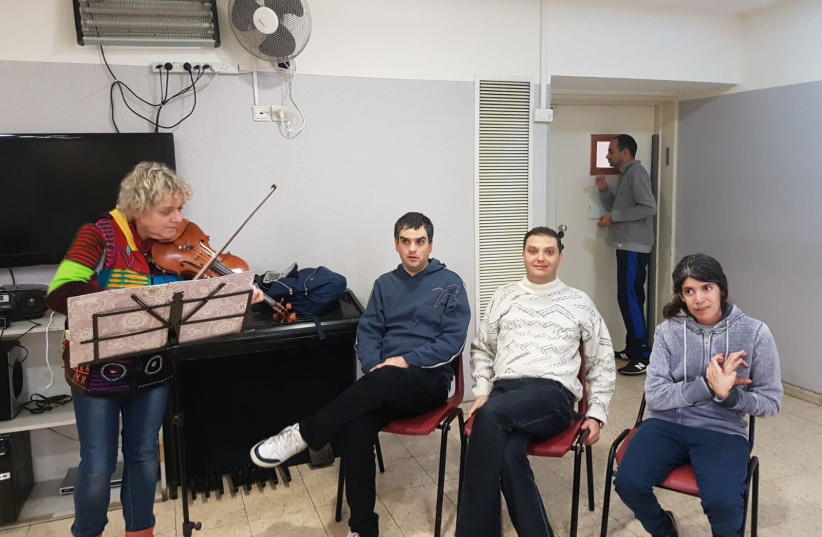Color to the World, an exhibit created by talented people with special needs, opened Wednesday night in Ganei Tikva. They are part of Pinot Igul, an organization that focuses on getting disabled artists’ works in front of the public’s eyes. Not only for the exposure, but for the cash.
Pinot Igul’s founder, director and curator, Eldad Shoshtari, born with cerebral palsy, decided to open the organization after he was having a hard time keeping up with the pace of office environments.
Motivated by his love for art and music, he went on a hunt for artists who might not have an easy time marketing and selling their own materials. He pulled together funding and began showing off artworks in venues around the country. One of his exhibits was even showcased in the office of the prime minister.
“Normal artists have a hard time promoting themselves. For a disabled person, it’s impossible because they don’t know how to interact or what to say and they stay in their corner in their comfortable space. So I did some research and found there was a demand for art from disabled people, that offices and places would love to display the art and even buy the art.”
The organization works with about 20 artists and are going to partner with ALUT - The Israeli Society for Autistic Children, where Shoshtari will represent their artists too.

The oval showroom boasted 52 paintings and pieces of art, and esteemed pianist Roy Ginat played sophisticated tunes throughout the evening. Ginat recovered from a massive brain tumor removal but became severely handicapped afterward. Today he plays with reputable artists around the globe.
The bright paintings filled the walls with pops of colors. One artist, Yosi Uziel, who was an architect in his youth, presented paintings with striking shapes and lines.
Another painter, Shaul Tzabari, who was badly injured while on duty in the army, uses his fingers to paint oil and acrylics on the canvas. He started making art while bed-ridden in the hospital, and staff were so encouraging of his works, he continued the practice for nearly 30 years. People who come to his home say art is hidden under every piece of furniture and behind every door.
“Every single painting is a wound I have suffered, so I don’t love my art,” Tzabari said. “Not only did I never think I could sell my art in the past, but I still don’t. I don’t need it to make a living, but I would use the money to make more art.”
Like all of the artists at the opening that The Jerusalem Post spoke with, Tzabari says working with Shoshtari is the only way he feels comfortable to exhibit or sell his pieces. One of Shoshtari’s intentions with his program is to help disabled artists make a living off their works.
Eyal Ben Zvi uses lottery tickets and magazine cut-outs to make collages that he says become works of art. He often uses politically-fueled images for his works and says he believes Israel can attain peace with their Palestinian neighbors. Ben Zvi is near-blind and suffered a severe head injury while on duty in the First Lebanon War.
“It’s all by my imagination. Each one is the same, but totally different at the same time,” Ben Zvi said. “When I am painting, I don’t feel crippled or wounded.”
One of the two invited speakers included Culture Minister Chili Tropper, who spoke eloquently to the crowd in Hebrew, but offered the Post a sincere sign-off in English on his way out.
“I was happy to come because I think it’s a way to say the government really believes that everyone has a place in the world, and I want everyone to come in and see these great pictures and see that everyone has dreams and everyone deserves the opportunity to express it,” Tropper said.
Doron Almog was also invited to speak. A decorated army veteran and recipient of the Israel Prize for his contribution to Israeli culture, he gave an emotional testimony about his severely disabled son, who passed away in 2007.
On the sidelines of the event, Almog shared some advice he had for able-bodied people who, according to him, don’t realize how temporary their lives and bodies are.
“When you see a disabled person sitting next to you on the bus or walking in the street, you need to understand that you might find yourself in the same position – whether by the pandemic, brain stroke or accident, and you should understand it’s imperative to accept them. It’s a social order,” Almog said.
Almog continued to say he liked the exhibit very much and considers it a presentation of personal ambition and power where each artist shifts his frustration or pain into something that expresses his inner world.
“We may not understand each painting on the wall, but we need to understand there is a soul and a human being behind every painting here,” he said.
Shoshtari sold four pieces of art by the end of the opening night and hopes to sell every last piece. The works range from NIS 650 to around NIS 3,400.
The exhibit, located at 20 Hacarmel St. in Ganei Tikva is open for another two months, from 10 a.m. to 1 p.m. daily and can be booked for afternoon visits.
